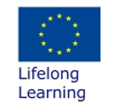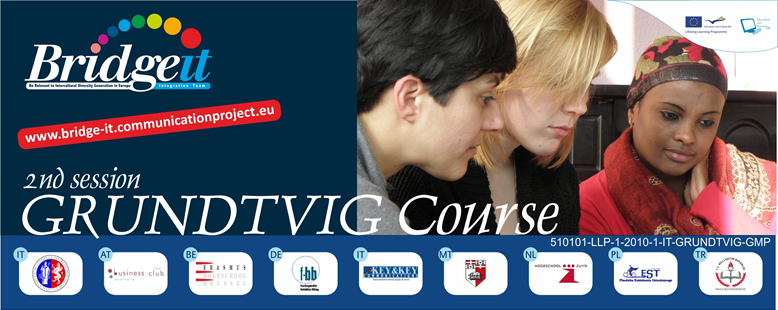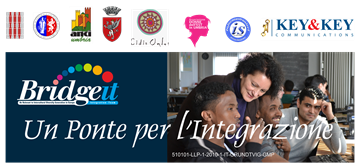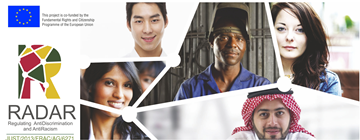
Preparation Following the registration for the course through the project website, all participants will be registered to the project’s platform (Virtual Learning and Communication Environment on Dokeos). There, they will be able to familiarise themselves with the tools and resources of BRIDGE-IT as well as from its predecessor projects SPICES (www.trainingspices.net) and e-SPICES (www.e-spices.net); they will be introduced to the methodology also through direct contact with trainers and tutors. Two weeks before the beginning of the residential phase of the training, participants will be provided with a range of exercises online (which they will complete at their own pace) and a pre-departure programme (specific suggested reading material, support documents, questionnaires) in order to build a portfolio of reading and reflection on one’s own experience with regard to diversity in communication practices. The preparatory activities will include: - collection of materials used in communicative situations and/or interactions with foreign people (e.g.: bureaucratic/official forms that foreigners have to fill in, audio/video recordings of such interactions and similar texts from real-life situations); - administration of the Learning Connections Inventory, the first step in the Let Me Learn® process, to discover and strategise one’s learning. Online facilities will also enable course participants and trainers to meet and develop a relationship before the residential phase begins. Objectives Adults who for diverse reasons move to another country have to deal with institutions and bureaucracy, which unavoidably becomes an important scenario of the daily communication exchange. Within this setting ‘adults-in-mobility’ (e.g. migrants) and ‘adults-in-contact-with-mobility’ (e.g. public officers) are the fundamental players. On one hand, lack of understanding and empathy between the two of them often lead to serious misunderstanding that could jeopardise the present and future of adults-in-mobility and, on the other hand, create stressful work for adults-in-contact-with-mobility. Our courses therefore address professional trainers, who are specialised in education for migrants and/or civil servants. Specifically the courses aim to develop awareness and competencies (in terms of knowledge, skills and attitude) in the field of interpersonal communication in bureaucratic-institutional settings and within an intercultural perspective. The courses set out to help participants: - acquire awareness of cultural diversity and its effect on communication practices - develop the ability to observe communicative interactions generally and in its intercultural dimension - learn about and focus on the four means used in the interpersonal communication process: verbal (words and discourses), paraverbal (voice), non-verbal (body), and visual (images, colours, shapes, symbols) - understand intercultural implications in institutional written texts: the bureaucratic language and terminology with particular focus on ‘first-impact’ situations - understand intercultural implications in public service encounters - experience and practise adequate communicative strategies for bureaucratic-institutional settings - learn to use and adapt the BRIDGE-IT VLCE (e-learning platform) resources and tools for learners’ needs in intercultural communication within bureaucratic institutions with particular focus on first-impact situations. Methodology BRIDGE-IT blended training consists of a combination of on-line and face-to-face learning activities based on a collection of real-life communication materials from a range of bureaucratic-institutional contexts from different countries. In addition to practical exercises focusing on the key aspect of experiencing specific intercultural situations (learning by doing), the course includes information sessions, short lectures and discussions. Great importance is given to the learning process itself and to the concept of “learning how to learn”. Therefore the course makes use of the Let Me Learn® Process (resulting from another Grundtvig project) as a methodology tool allowing trainers to respect participants’ different ways of learning and trainees to discover about and “take control of their learning processes and adapt them in order to meet learning expectations”. The course underlines the importance of informal learning (through a half-day excursion dedicated to observation and experimentation) as well as giving space for interpersonal contacts during meals and free time) and non-formal learning. BRIDGE-IT methodology makes use of: - Learning according to specific communicative needs and settings - Interactive training in small groups - Cooperative learning - Problem solving, simulations and role play, and critical incidents - Self assessment exercises - Autobiographical approaches. Follow-up A follow-up phase that includes post-course assignments and further online modules to be completed through the online instrument is scheduled within the course programme. The BRIDGE-IT trainers and tutors will be available via the project platform and/or email. A participants’ mailing-list will be set up for peer networking with the aim of setting up a community for exchange of good practices and for the development of new ideas in the field of intercultural communication for bureaucratic-institutional purposes between ACMs and AMs. In addition to written evaluation during the course, participants will receive an invitation to an online evaluation tool, two weeks and six months after the course in order to elaborate on their learning triggered by their course experience. |














































